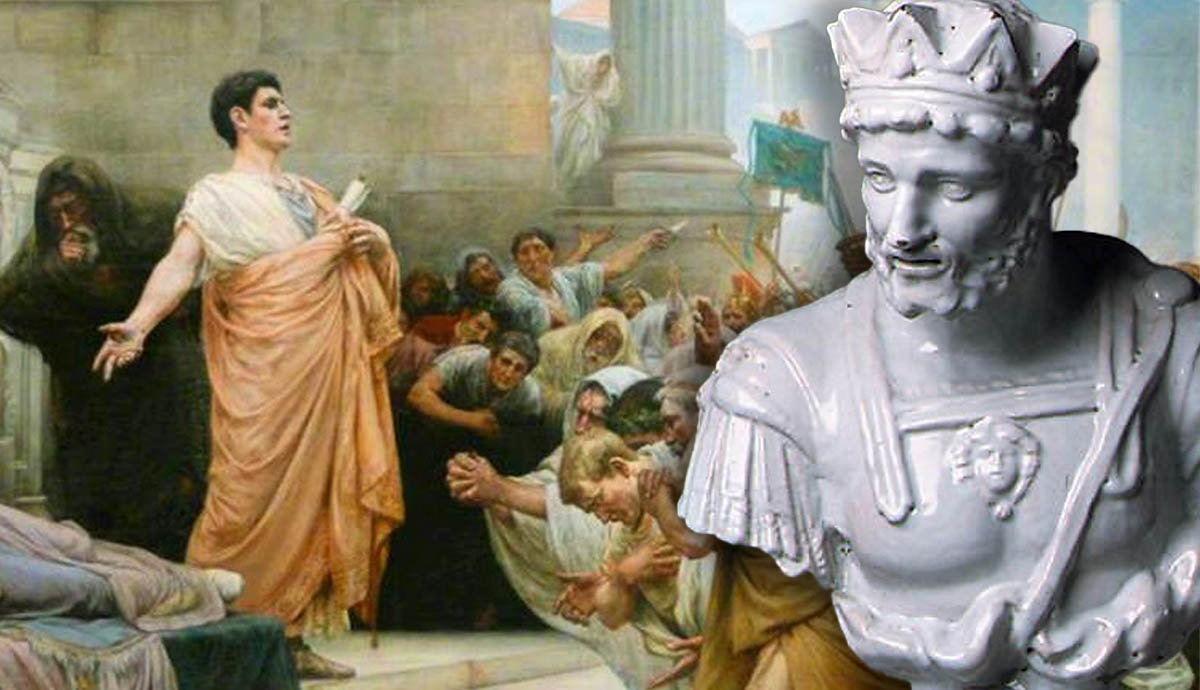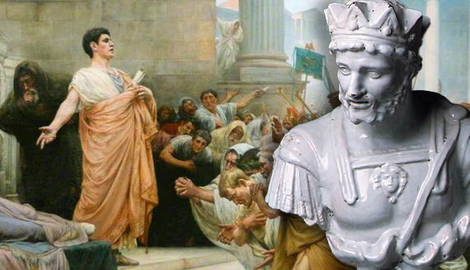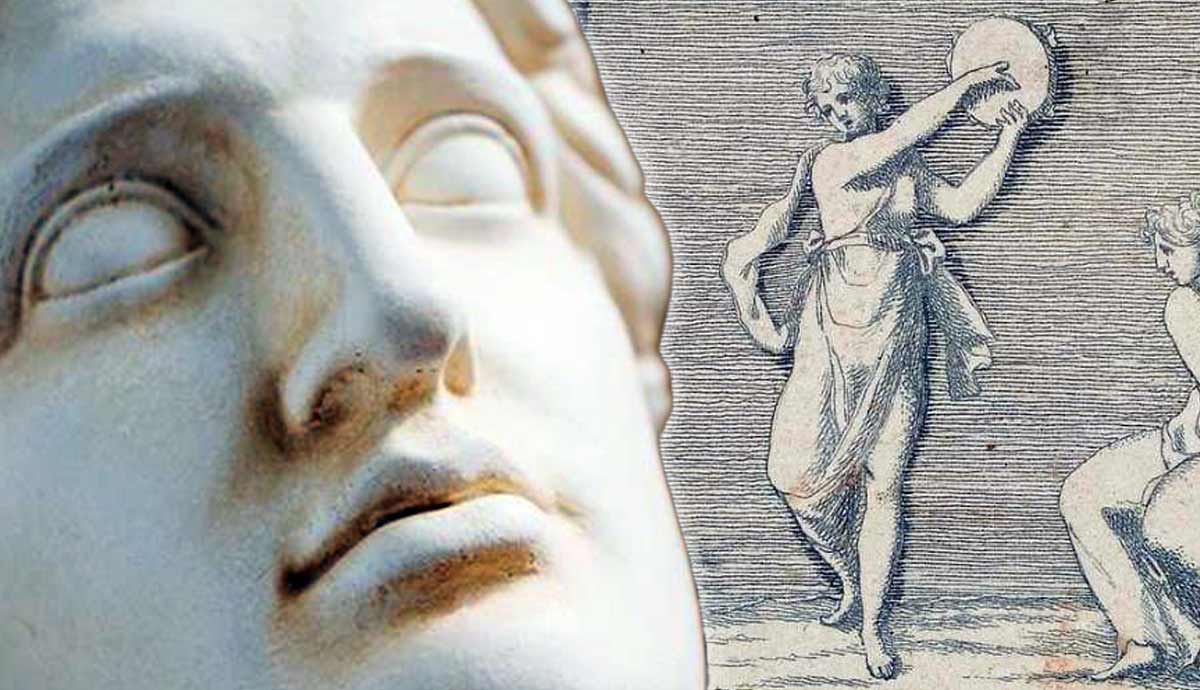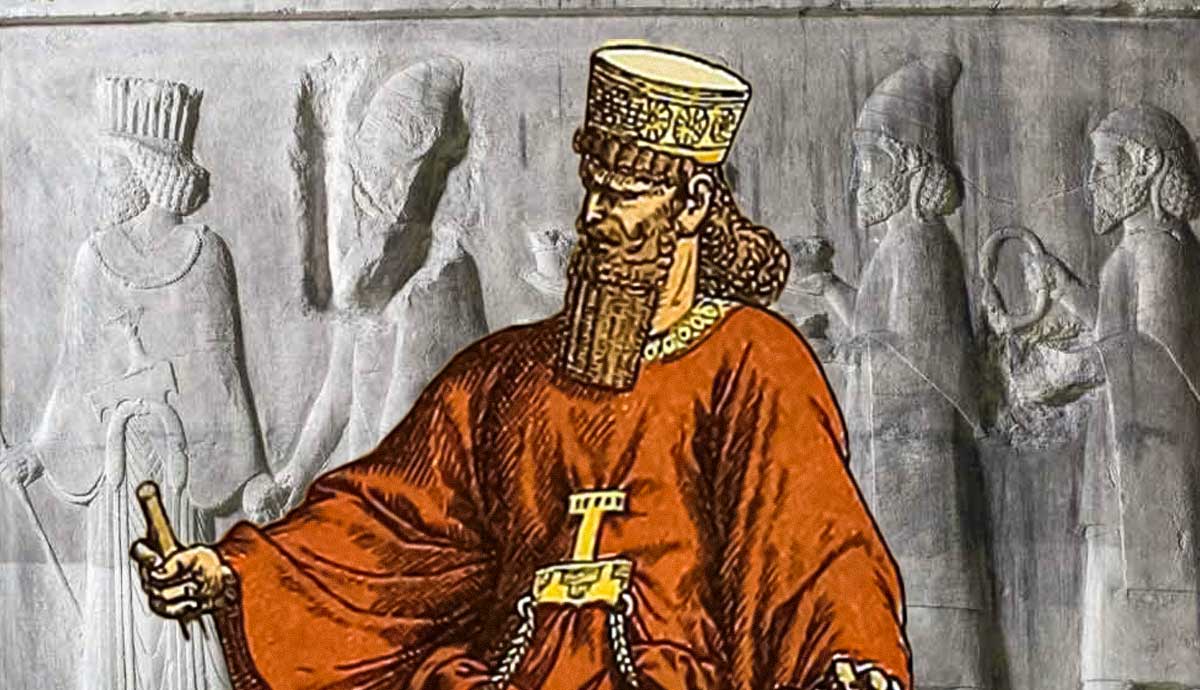
History has been harsh on the memory of Mark Antony. But flawed though he was, he was also brilliantly talented.
“The evil that men do lives after them;
The good is oft interred with their bones; …”
[William Shakespeare, Julius Caesar, Act II, Scene 3]
These words, spoken through Mark Antony in honor of the assassinated Julius Caesar, were imagined by William Shakespeare. Yet, their sentiment could so easily apply to Antony himself. Historical figures are nuanced, complex, and contradictory. Just as they are capable of great acts, so too can they prove to be fallible, and tragic. Both Antony and Cleopatra, his Egyptian lover, have become iconic.
The Young Hero Mark Antony

First and foremost, Antony was a soldier. As a young man, he went to Greece to train in oratory and soldiering. Serving the proconsul Gabinius in 57 BCE, he fought with distinction in Syria. As commander of the cavalry, he earned kudos for his fearless military exploits.
With a chiseled jaw and a strong athletic body, Mark Antony was every part the swashbuckling, young hero. By 55 BCE Gabinius and Antony were in Egypt, trying to re-establish the claim of Ptolemy XII Auletes. This was Antony’s first foray into Egypt, a land that would shape his destiny.
With ties to the popular politician, Clodius, and familial connections on his mother’s side, Mark Antony next secured a post on the staff of Julius Caesar. Serving in 54 BCE, in Caesar’s Gallic campaigns, Mark Antony showed exceptional promise. Caesar so valued the young man that Antony’s political career was sponsored, and he became a Quaestor in 52 BCE. However, by 52 BCE he was back with Caesar in Gaul at the famous Battle of Alesia.
Mark Antony’s next role was as Caesar’s proxy in Rome, resisting the damage done by Caesar’s Optimate enemies, who wanted to strip him of his command and prosecute him. By 49BCE, Antony — now Tribune of the Plebs — was vigorous in his interventions in the Senate. Agent to Caesar though he was, he was also growing as a political figure in his own right. His eventual expulsion from Rome gave Caesar his critical reason for unleashing a civil war.
Caesar’s Man

As Caesar seized Italy and scattered Republican forces under Pompey, Mark Antony played a key role. While Caesar pursued a war in Spain, Antony administered Italy, his colleague Marcus Aemilius Lepidus acting as governor of Rome. Well-liked by the soldiers, one of Antony’s earliest failures would manifest in his role as civil governor of Italy. Complaints of a lax, and high-handed administration followed, and the foundations of “Mark Antony the villain”, started to be laid.
A recurrent theme throughout his career, the notion that Antony cared nothing for Republican sensibilities, made for easy propaganda for his enemies. The accusation that Antony was arrogant, reckless, and lazy with men’s legal rights, mattered, especially among Roman citizens, who had known only the protection of the Republic. Antony was no greater a robber of men’s rights than any Caesar or Octavian. Yet, unlike them, Antony failed to understand the importance of appearance.
However, Antony was also brilliant. A hero on the battlefield, Caesar granted him command of his left wing at the Battle at Pharsalus in 48 BCE, where Pompey was defeated. A true soldier, he was beloved by his men, eating, drinking, and joking easily with the troops. These were not just gestures, Mark Antony being also an immensely able commander that frequently went into battle:
“… when Caesar’s men were in headlong flight, he [Antony] met them, turned them back, forced them to stand and engage again their pursuers, and won the victory. Accordingly, next to Caesar, he was the man most talked about in the camp.”
[Plutarch, Life of Antony, 8]
Questions About Antony

Yet, the flaws in Mark Antony’s political leadership came again in 47 BCE. As Master of the Horse, he presided over violent political fighting in the forum of Rome. Brutally suppressing the political legislation of his rival Dolabella, Romans were shocked, and the trouble compelled Julius Caesar to return from Egypt. The specter of “Antony the villain” was taking shape.
As Republicans saw it, who, but Mark Antony — the junior despot — would have the gall to offer Caesar — the arch despot — the crown of Rome? Romans detested kings and tyrants and it was this that would cost Julius Caesar his very life. That Antony was spared murder, rested only on the fact that even Caesar’s assassins, could not decide if Antony was a hero or a villain:
“… Brutus opposed the plan [to kill Antony], insisting in the first place on a just course, and besides, holding out a hope of a change of heart in Antony. For he would not give up the belief that Antony, who was a man of good parts, ambitious, and a lover of fame, if once Caesar were out of the way, would assist his country in attaining her liberty …“
[Plutarch Life of Brutus, 18]
An Emerging Political Figure

With Caesar dead, Mark Antony was the sole consul of 44 BCE. Manipulating events to deliver a funeral oration to the mob in Rome, Mark Antony masterfully turned the volatile crowd as they gazed upon the bloody carcass of Caesar:
“Of what avail, O Caesar, was your humanity, of what avail your inviolability, of what avail the laws? Nay, though you enacted many laws that men might not be killed by their personal foes, yet how mercilessly you yourself were slain by your friends!” [Cassius Dio, History 44.49.3]
This was “Mark Antony the orator” and his intervention fundamentally changed Roman history: unleashing events that would force the murderers of Caesar to flee the city. In sole possession of Caesar’s legal will, Mark Antony was now de facto leader of the Caesareans. He was almost perfectly placed to take on Caesar’s historical legacy. Almost, and yet, not quite.
The arrival into public life of Caesar’s adopted heir, the teenager Octavian, was nothing short of disastrous for Mark Antony. Fatally underestimating the ability of his youthful rival, Antony controlled the estate of Caesar, refusing to relinquish Octavian’s inheritance. Octavian, eventually borrowed money to pay out Caesar’s legacy — giving money to citizens and veterans alike — and outsmarted the seasoned general.
Gathering Clouds

Senatorial support also flowed to Octavian from highly influential men like the orator, Cicero. A self-styled champion of the Republic, Cicero had no love for Octavian, but was willing to build him up, against the seemingly more odious Antony. While Antony and Octavian raced to recruit veterans, Cicero railed against Antony in the Senate. In a series of polemics from 44/43 BCE, known as the Philippics, Cicero destroyed Antony’s image, portraying him as a degenerate, a drunk, a womanizer, and a despot:
“For in what country of barbarians was there ever so foul and cruel a tyrant as Antonius, escorted by the arms of barbarians, as proved in this city?”
[Cicero, Philippics, 13.8]
It did not help that Antony was a very open drinker and womanizer. Little different from many other leading Romans, Antony’s real failing was his political naivety and his failure to grasp political optics. Antony reveled in aspects of his notoriety, but he did not appreciate the damage this did to his political capital. Not for the last time, Mark Antony would lose the great PR war of history.
Civil conflict broke out in 43 BCE over the allocation of consular provinces. Mark Antony illegally marched against one of Caesar’s assassins, Decimus Brutus. With Antony declared an enemy of the state by the Senate, the consuls Hirtius and Pansa, with the young Octavian, marched against him, only narrowly defeating him at Mutina. Winning one earlier battle — and facing three armies — Antony was compelled to withdraw, masterfully maintaining his battered forces. Two Republican consuls died as a result of this fighting.
The Second Triumvirate

Though Antony and Octavian had no love for each other, the Senate’s next attempt to sideline the young Caesar, now drove him into an alliance of convenience with Mark Antony. Joined by Lepidus, this was the so-called Second Triumvirate; a power-sharing alliance, that allowed the Caesareans to dominate the state and avenge themselves on the remaining assassins of Caesar.
Nothing seals an alliance like a bloodletting. These so-called proscriptions followed the model created by the dictator Sulla in 82 BCE. Prominent enemies in Rome were named publicly on “kill lists”, which rewarded citizens for their legal murder. 300 senators and 2000 knights were targeted for their Republican or anti-Caesarean leanings, as well as for vindictive and financial motives.
For the great Republican statesman Cicero, this meant a grizzly end. No longer needed by Octavian, Antony wanted revenge on Cicero, a long-time family enemy, and his personal nemesis:
“… after Cicero had been butchered, Antony ordered his head to be cut off, and that right hand with which Cicero had written the speeches against him. When they were brought to him, he gazed upon them exultantly, laughing aloud for joy many times; …”
[Plutarch, Life of Antony, 20]
The crimes fell equally on the Triumvirate, though it was to Antony that most of the odium attached itself. This was truly “Mark Antony the villain”.
Antony Looks East

The Triumvirs fought with the surviving assassins of Caesar — Brutus and Cassius — in the East, and Sextus Pompey (son of Pompey the Great) who held Sicily, in the West. Brutus and Cassius were defeated at the pivotal battles of Philippi in 42 BCE. Octavian, never a natural soldier like Mark Antony, abandoned his camp when his troops were routed by Brutus. Fleeing for his safety, it was Mark Antony’s forces that saved the day. In effect, Antony was the savior of Octavian, and it was not the last time that he would save his rival’s life.
The Triumvirs now partitioned the provinces, with Mark Antony receiving the major share, including all the Eastern provinces. He could now pursue his intended war with Parthia and align further with Julius Caesar’s legacy. Going East, Antony cultivated himself as a pro-Hellene, basing himself in Athens for the remainder of 42 BCE and identifying himself with various aspects of Hellenic culture and religion. Progressing through Asia Minor it was at Tarsus that he first received Cleopatra, a figure he had met before, but who would now fundamentally shape his life.
“Antony proceeded to Asia, where he met Cleopatra, queen of Egypt, and succumbed to her charms at first sight.”
[Appian, Civil Wars, 5.1.1.]
Egypt was a powerful vassal kingdom and was essential to Mark Antony’s consolidation of power in the East. In turn, Antony offered the Egyptian Queen a powerful patron, and protector. Cleopatra, a woman said to possess as much charisma as beauty, engaged Antony with a bold wit and irreverent style. Although politics governed their alliance, there is no reason to doubt that Antony and Cleopatra were truly one of history’s great love affairs.
Antony and Cleopatra

Antony and Cleopatra cemented their relationship, and the queen bore him two children in 41 BCE and a third in 36 BCE. This again fulfilled an aspect of Caesar’s legacy, as he too had sired a son — Caesarion in 47 BCE — by the captivating Egyptian Queen. Although war with Parthia loomed, Mark Antony was forced in 40 BCE to go back to Italy when factional fighting broke out: his then-wife Fulvia, and his brother Lucius Antonius challenged Octavian to armed conflict. Only Antony’s personal intervention averted a fracture, and he was obliged to marry Octavian’s sister Octavia.
The Triumvirate was renewed again in 38 BCE, and Italy was still dogged by the piratical raids of Sextus Pompey. The blockades brought great hardship to Rome, which was starved of grain. On one occasion in 39 BCE, it was again Antony — now back in Rome — that saved Octavian from an angry mob that sought to stone the young Caesar to death. This was the second time Antony had saved Octavian’s life, but Augustan propaganda would never allow for the notion of “Antony the hero”.
Mark Antony’s marriage to Octavia restored a fragile peace, yet despite living and having children with Octavia, Antony abandoned her in the years afterward. In 35 BCE he declined to see Octavia when she came to him in Athens, and in 33 BCE, he divorced her. His ongoing love affair with Cleopatra was a public snub that was exploited fully by Octavian. “Antony the bad husband”, was shunning a good Roman woman, for a cynical foreign temptress. This triggered all kinds of Roman, xenophobic prejudice, and Antony’s reputation suffered further.
An Eastern King?

War with Sextus Pompey ended with his defeat in 36 BCE, and Lepidus was expelled from the Triumvirate when he came into conflict with Octavian. It was now a two-horse race, between Antony and Octavian. The latter had benefited from declaring an amnesty for exiled Romans and many were enticed back to Rome. Romans now faced a choice between a “Roman” leader in the West, and an absent “Eastern” ruler, married to a foreign Queen.
Although Antony would hold the consulship once more in 34 BCE, the two men were on an inevitable collision course. The distribution of legions for Antony’s continued wars with Parthia, and Antony’s public snubbing of his legal wife Octavia, all worsened relations. They were symptoms of a deeper crisis: the Roman Empire could have only one master.
Octavian’s regime had an unmatched talent for propaganda, both cultural and political. It was easy to vilify Antony, the degenerate, the poor husband, and the foreign cuckold. Always politically naïve in the face of sophisticated operators like Cicero, and Octavian, Antony’s high-handed style did not help either. Although the bitter war of slander went both ways, Antony, for the second critical period in his career, was losing the propaganda battle.

In Roman eyes, Antony had become a man who had forsaken his heritage:
“… [Antony] has abandoned his whole ancestral way of life, has embraced alien and barbaric customs, has ceased to honor us, his fellow countrymen, or our laws, or his father’s gods.”
[Cassius Dio, Histories, 50,25.1]
Increasingly identified as a distasteful Eastern King, Antony and Cleopatra were now seen as rivals to Roman power. By 36-35 BCE Antony’s campaigns in the East against the Parthians were increasingly conducted without reference to Rome and funded by Egyptian and Eastern clients. Campaigning in 35 BCE did not go well, and to some, in the West, it seemed like the great commander might also be faltering. Octavian on the other hand — now free of Sextus Pompey — was flourishing in Italy.
Antony Falters

In 34 BCE Antony declared himself finished with his alliance with Octavian. Announcing dynastic legacies for his children, he had established a new Eastern dynasty and a rival to Roman power. Intolerable to Octavian, Antony had abandoned his “Roman-ness”, behaving with the high-handedness of a foreign despot.
By 32 BCE the Senate declared war on Cleopatra as a foreign adversary. Antony was stripped of his powers, though he was not named an enemy. This was Octavian’s genius for spin. The destruction of his rival would be part of a foreign war and not a civil one. Rome in all its virtue was almost rescuing its misguided countryman, laid low by a foreign queen:
“Worst of all, they are not ruled by a man, but are the slaves of a woman, and yet they have dared to claim our possessions, and to employ our fellow countrymen to lay hands on them as if we would ever consent to surrender the prosperity which belongs to us.”
[Cassius Dio, Roman Histories, 50,25]
Antony and Cleopatra’s forces were defeated at the great naval battle of Actium in 31 BCE. Contemporaries questioned why Antony fought on sea when he had so many strong legions on land. Our sources also depict Mark Antony as quick to abandon the field. Not the implacable, ‘never say die’ commander of old.
Mark Antony retrenched in Egypt, where in 30 BCE, he committed suicide in a decidedly “Roman” fashion. In his final hours of death, he was taken to Cleopatra’s side. History has rarely written more poignant endings.
Mark Antony: A Conclusion

So passed Antony, the hero, and the villain. On the wrong side of history, Antony was both brilliant and deeply flawed. In acknowledging that, we must always remember that his reputation was fatally compromised by some of the most effective propaganda ever deployed. Cicero and Octavian, two of the sharpest political adversaries in history, gave us the Antony we know today. Their impact was profound. Yes, Mark Antony could be terrible, but how much the villain and how much the villainized, is always debatable. A hero, maybe not, but as the esteemed Brutus himself acknowledged, Antony was “a man of good parts”.
An incredible soldier, a capable orator, and a leader of men. A flawed, naïve politician, prone to arrogance, Antony could be a loyal friend and the bitterest of enemies. A heavy drinker, and an inveterate womanizer, he was a great lover and a poor husband. Mark Antony, the supremely talented, tragic man, was all these things.










